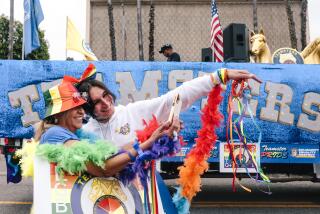Two-Tier Wage Clauses a Problem for Unions
Both the Teamsters Union and the Independent Union of Flight Attendants this week reached tentative contract agreements that include major concessions to management. These agreements go against the recently developing trend away from “concessionary” bargaining.
While the Bureau of Labor Statistics reports that wage increases these days are lower than in recent years, contract settlements lately have been providing wage boosts of between 3% and 5% without significant “give-backs” by unions.
But those negotiating for the Teamsters with major trucking companies and for flight attendants with Pan American agreed to accept two-tier wage structures, largely in recognition of the fact that the trucking and airline industries have been struggling.
Two-tier wage structures have become one of the most serious problems for workers and one of the most effective ways that management has found to cut labor costs. They come in two forms: In one, newly hired workers start at lower rates of pay but eventually catch up to more experienced workers doing the same job. The Teamsters’ pact is an example. In the other, the pay rate for new workers is permanently lower than that for others, as provided in the flight attendants’ agreement.
In recent years, union workers confronted with recessions and high unemployment often took significant wage cuts and made other concessions just to keep their contracts or jobs.
Union workers have also accepted, with great reluctance and sometimes only after long strikes, one-time pay bonuses instead of permanent boosts, increases in the number of part-time workers and reductions in or even elimination of cost-of-living clauses.
Although workers may find the effects of such concessions lingering for years, there is some good news for labor. In return for “give-backs,” many unions are getting some concessions of their own from management.
More than ever, union contracts today include provisions for employee stock ownership plans, profit sharing, worker participation in managerial decisions and worker representation on corporate boards. Few of these contract provisions are new ideas, but the rapidly increasing number of management and labor concessions is reshaping traditional contracts--which generally included only clauses on annual pay raises, cost-of-living increases, health care, pensions, holidays and vacations.
In many cases, the government is making it well worth it for companies and unions to seek such provisions.
The number of employee stock ownership plans has more than doubled in the last five years and now covers more than 7 million workers, according to David Binns, managing director of the Washington-based Employee Stock Ownership Assn.
Jack Curtis, a San Francisco-based ESOP attorney, said one reason for the plans’ increasing popularity is the tax benefit to the company. In 1974, company contributions to an ESOP became tax deductible.
Last year’s tax revisions passed by Congress included an even more attractive incentive. The new law lets banks pay taxes on only half of the interest that they earn from money lent to an ESOP. That means banks can make loans to ESOPs for less than the market rate of interest, Curtis noted. The company then gets the money the ESOP borrowed by giving the ESOP shares in the company.
In the long run, such plans are expected to benefit management and workers by giving employees an interest in their companies’ profitability.
But unless the workers combine the power of the shares they own as individuals in an ESOP, they cannot be the decisive factor in managing the company they partly own.
An estimated 7,000 companies now have ESOPs, with workers in about 20% of these owning more than half the stock. However, workers have actually taken control in only a handful.
Profit-sharing plans are also on the rise. Many companies initiate them as an incentive for workers, but others use profit sharing as a lure to get workers to accept contract concessions.
In the last five years, the number of workers covered by profit-sharing plans has increased from about 17 million to more than 20 million, and the number continues to increase rapidly, according to the Evanston, Ill.-based Profit Sharing Research Foundation.
Other shifts in contracts are more difficult to quantify. While fewer than a dozen major companies have worker representatives on their boards, many of the nation’s largest companies have adopted some form of worker participation in the corporate decision-making process.
But while such devices as ESOPs, profit-sharing and employee-participation programs usually help workers, other shifts from traditional contracts, notably the two-tier structure, hurt them.
Management often finds it easy to push through a two-tier plan because it affects workers not yet employed. The two-tier wage structures are easier to sell to workers because, generally, those already on the payroll don’t have to take a pay cut and often are even given pay raises.
It is one thing for workers to be concerned about their own wages but more difficult to persuade them to fight and, if necessary, strike to protect the wages of people who haven’t been hired yet.
Striking workers in the past have shown a willingness to forgo wages for a limited time in anticipation of larger wage gains. They have been willing to sacrifice for contract gains that will help future workers--perhaps their own sons and daughters.
These days, however, strikes are increasingly rare. That is why management seems more determined than ever to add two-tier wage systems to labor contracts.
Many company managers, like unions and their members, resist two-tier systems because they can lead to serious friction by requiring two workers to perform the same job at substantially different rates of pay.
However, Daniel Mitchell, director of the UCLA Institute of Industrial Relations, said a survey that he and UCLA Prof. Sanford M. Jacoby have just completed of Los Angeles-area companies showed that managers who have tried two-tier wage systems have found far fewer problems than were anticipated by managers who had never used them.
But at least half of all managers agreed that such systems hurt employee morale.
Mitchell says there is no advantage for workers in a two-tier wage structure, other than the obvious: Some economically distressed companies could be forced out of business and all jobs lost if they did not cut their wage costs. However, the UCLA survey found that managers generally agree that two-tier wage structures “need not be confined to circumstances where the employer is economically distressed.”
The study offered one hopeful sign for workers, although it may not become a reality for several years: Most managers believe that two-tier wage plans will eventually be eliminated as unions become strong enough to dispense with them in future contract negotiations.
Endorsement Debate
AFL-CIO leaders again have adamantly rejected advice from the chairman of the Democratic Party that the labor federation stay out of all Democratic presidential nomination contests.
Two weeks ago, AFL-CIO President Lane Kirkland started telling regional labor conferences that it was a major achievement for labor when the 13.5-million-member federation united for the first time to endorse a candidate before the primaries--Walter F. Mondale. Kirkland told the unionists that such unity should again be a goal for the federation’s 96 affiliated unions, which in the past, he says, have wasted valuable time and money campaigning for different candidates.
Last week, however, Democratic National Chairman Paul G. Kirk Jr. called on the AFL-CIO to stay out of the 1988 Democratic presidential nomination contest. It was the same advice offered last year by Kirk’s predecessor, Charles Manatt, who felt that labor’s endorsement ended up hurting Mondale’s campaign because the public perceived him to be a captive of special interests.
Kirkland insists, on the other hand, that it was Reagan’s popularity and the relatively healthy state of the economy that caused Mondale’s defeat.
“If we can, we will continue to make early endorsements in the future, only the next time we will do it better,” Kirkland is telling the labor groups.
However, circumstances may force the AFL-CIO to refrain from making an early endorsement in 1988.
Last week, Sen. Edward M. Kennedy (D-Mass.) indicated that he may well enter the 1988 contest, and Kennedy has strong support within organized labor. New York Gov. Mario Cuomo is also a popular figure among unionists, and he, too, is said to be considering entering the fray.
The AFL-CIO has a rule that allows it to make an early, pre-primary presidential endorsement only if a candidate gets a two-thirds vote at a special convention of the federation.
Pitting two candidates such as Kennedy and Cuomo might mean that neither would get the required vote and, therefore, that there would be no early endorsement.
But if there is no early endorsement, it will not be because of the advice of politicians like Kirk, who object to the idea as a matter of principle.
Kirk told the AFL-CIO that it should stay out of the presidential primary contests and “let the candidates use the primary process to develop and demonstrate their own broad appeal and their own strong political base before giving one your full and united backing.”
The federation’s past policy of waiting until the Democratic Party nominated a candidate meant that the AFL-CIO was then almost automatically committed to supporting any candidate nominated by the Democrats. Kirkland favors early endorsement to give unionists a bigger role in selecting a candidate. Federation spokesman Murray Seeger said the AFL-CIO supports the position taken last week by Kennedy in a speech at Hofstra University that “we (Democrats) must understand that there is a difference between being a party that cares about labor and being a labor party.”
While Kennedy has not commented on Kirk’s advice that the AFL-CIO not make early presidential endorsements, the senator said last November that he has always had AFL-CIO support in his political campaigns and that “if I do decide to run for President again, I would certainly welcome an endorsement once more.”
More to Read
Inside the business of entertainment
The Wide Shot brings you news, analysis and insights on everything from streaming wars to production — and what it all means for the future.
You may occasionally receive promotional content from the Los Angeles Times.










